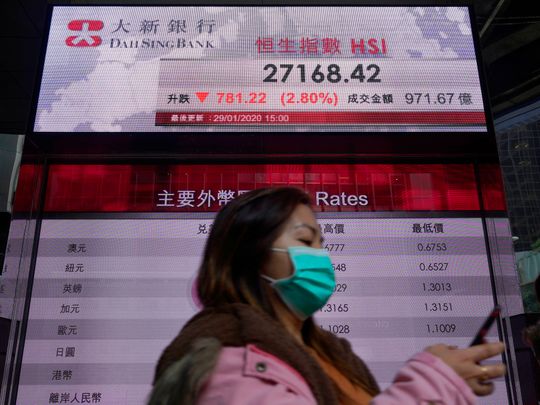
Dubai: As markets assess the damage from an escalating virus outbreak, analysts sought to reassure investors of the fleeting effect the China-emanated illness will have in the long run.
Global markets have been embroiled in a rapid sell-off the last few days, but a slow recovery was starting to appear as China — where the virus originated — and neighbouring countries took strict measures to curb travel.
Shares of stocks that have been hit recently by fears about the spreading coronavirus in China continued to bounce back on Wednesday. Investors partly shifted their focus to the ongoing rush of corporate earnings, with Apple leading a slew of companies that reported better-than-expected earnings.
US indices gains
Wall Street indices gained, with the Dow rising for a second day, snapping a five-day losing streak. That move up helped the S & P500 and Nasdaq recover some of the losses from the largest sell-off of the year, which happened Monday amid global concern over the spread of the Chinese coronavirus.
Investors are closely watching the US Federal Reserve, as the central bank convenes for its first monetary policy meeting of the decade. The main interest rate is widely expected to hold steady, but the market are attuned particularly for any comments the potential economic impact of the coronavirus outbreak.
HK stocks hit
But Hong Kong stocks had their worst day in almost six months Wednesday as investors returned from a four-day holiday. Hong Kong’s key stock index the Hang Seng Index opened 3 per cent below its close on January 24. Eight cases were confirmed in Hong Kong, and officials said it would close off some parts of its border with mainland China while also curbing inbound air travel from the mainland by half.
Hong Kong markets are likely to keep suffering, too, particularly as markets in mainland China are still closed for the Lunar New Year, wrote Jeffrey Halley, senior market analyst for Asia Pacific at Oanda. Markets in mainland China remain closed and will reopen next Monday.
No long-term risk
Mark Matthews, head of Asia research at Julius Baer, said there is no reason an investors’ long-term portfolio assets will have an impact, but added those with a risk-prone portfolio should seek risk-off markets over the next few months — that could be buying put options, stocks, treasuries, bonds or gold.
“The virus like the other viruses that occasionally originate out of China like avian influenza, swine flu, SARS will be transitory,” Matthews said. “However, transitory still involves a certain time period, which I assume the summer is when we will get a peak in number of new cases reported — which is when markets stabilised for SARS.”
“I think it (risk) will eventually come down,” Matthews added.
China to act
“China isn’t going to stand idly by and I fully expect next week China will provide a very strong monetary response,” Matthews said, adding that the economy was starting to pick up before the outbreak and a fiscal response means that it might even end up accelerating GDP growth.
When you think back to the Tsunami in 2004, for example, fiscal and monetary response ended up boosting economic growth, Matthews added.












